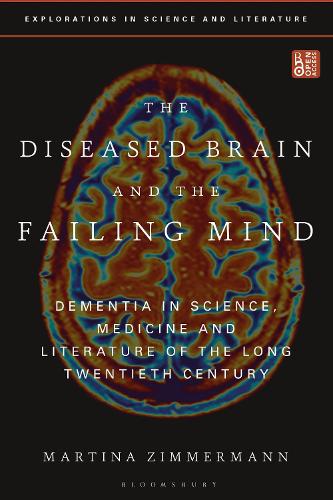
The Diseased Brain and the Failing Mind: Dementia in Science, Medicine and Literature of the Long Twentieth Century
(Paperback)
Available Formats
Publishing Details
The Diseased Brain and the Failing Mind: Dementia in Science, Medicine and Literature of the Long Twentieth Century
By (Author) Dr Martina Zimmermann
Bloomsbury Publishing PLC
Bloomsbury Academic
27th January 2022
United Kingdom
Classifications
Tertiary Education
Non Fiction
Literary theory
History of science
809.933561
Physical Properties
Paperback
284
Width 156mm, Height 234mm
404g
Description
This book is available as open access through the Bloomsbury Open programme and is available on www.bloomsburycollections.com. It is funded by The Wellcome Trust. The Diseased Brain and the Failing Mind charts changing cultural understandings of dementia and alzheimers disease in scientific and cultural texts across the 20th Century. Reading a range of texts from the US, UK, Europe and Japan, the book examines how the language of dementia regarding the loss of identity, loss of agency, loss of self and life is rooted in scientific discourse and expressed in popular and literary texts. Following changing scientific understandings of dementia, the book also demonstrates how cultural expressions of the experience and dementia have fed back into the way medical institutions have treated dementia patients. The book includes a glossary of scientific terms for non-specialist readers.
Reviews
Zimmermanns analysis of literature, medicine, and science addressing dementia and caregiving in diverse cultures is a reminder of the importance of cross-disciplinary and cross-cultural knowledge for social workers. * Affilia: Feminist Inquiry in Social Work *
Martina Zimmermanns The Diseased Brain and the Failing Mind summarizes the preoccupation of Western culture with dementia as defining not only the aging process but also the very essence of the identity. Zimmermann, a trained neuro-scientist and a sharp-eyed literary critic, illustrates how scientific models of mind and brain, of neural networks and brain chemistry, reflect the cultural assumptions of how mind, brain, and body are believed to function. Her close reading of the literary reflections on aging and dementia from the Edwardians to contemporary film shows that science is as often indebted to cultural paradigms as cultural paradigms reflect scientific assumptions. If you still believe that playing Sudoku will prevent you from developing Alzheimers perhaps you should better spend your time reading this book! * Sander L. Gilman, Distinguished Professor of the Liberal Arts and Sciences, Emory University, USA *
Author Bio
Martina Zimmermann teaches at the University of Warwick, UK, and is Privatdozentin at Goethe University Frankfurt, Germany. She trained as a pharmaceutical scientist and specialized in neuropharmacology before moving into research in the health humanities. She is the author of The Poetics and Politics of Alzheimer's Disease Life-Writing (2017). She has recently been awarded a UKRI Future Leaders Fellowship with which she returns to the Department of English at Kings College London, where this monograph had been researched.
